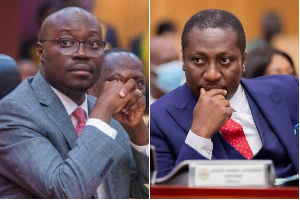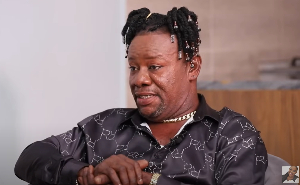Dear Editor,
Improving Doctor-Patient Ratio In Ghana – Rejoinder
I read a feature article on improving Doctor-Patient ratio in Ghana with much interest. I agree with the government on the fact that the areas most deprived are the rural and suburban communities. I believe that the involvement of doctors in the National Service Scheme will go a long way to help and, may be a catalyst to disabuse the minds of some doctors that rural areas are not conducive to their status. Ghanaians are by nature very hospitable and doctors being the personnel responsible for healing pains and diseases will be welcomed like kings in these areas. To help inculcate countryside (rural) consciousness in doctors, medical students should be encouraged to acquire rural experience by utilising rural health facilities for training purposes.
However, I am writing this piece because, I think this measure is not enough to solve doctor-patient ratio in the rural areas. I suggest that two other measures need consideration.
1. The government and particularly the Ministry of Health should consider not making doctors the heads of the District Health Management Teams (DHMT) in the first five years after their graduation and posting. This will free all the many doctors in the rural and suburban areas who are only there as administrators instead of doing what they have been trained and know how to do best – that is treat patients. There are a number of qualified health administrators who will do a far better job than the new doctors in managing the DHMTs. The doctors will be far useful in the consulting rooms than as administrators. In fact, they cause a lot of problems to healthcare delivery as administrators. In places, where resources are not enough, the few available vehicles and other resources have been monopolized by these doctors for personal rather than healthcare delivery purposes.
Unfortunately, the Ministry of Health (“Ministry of Hell”) and healthcare delivery is generally set up for doctors and nurses and any other professionals are “paramedical” and have no status or are dispensable. It is, therefore, going to be very difficult and “unthinkable” in certain quarters not to make the doctor the head of any structure in the ministry’s set up.
Along with this measure, the Ministry should try and promote the work of the other health professionals in healthcare delivery and make them also as respectable as the doctors and nurses. It is fundamental to realize that “health system does not equate with doctors”. Doctors are simply a constituent part of the system, though they tend to traditionally aspire to leading roles by virtue of their professional status, skills and age. We know and accept that doctors are very important and indispensable in healthcare delivery system, but in the age of disease control and primary health care, relying solely on disease management instead of disease prevention is very inadequate. In many areas where, healthcare delivery has been successful, the approach has been on disease control involving multisectoral approaches involving all health professional and social and behavioral scientists. These personnel should be given the recognition they deserve and empowerment necessary and should be allowed to do what they have better expertise to do than doctors. The situation where paramedical personnel with higher degrees including Ph. D are made to serve under doctors with limited knowledge of these areas should be discouraged. It breads discontent and discourages efficient healthcare delivery.
Let me give one example of what I am saying. The Ministry of Health has Biologists whose responsibility is to collect and collate disease incident data and to investigate disease outbreaks in the country. The Biologists are all graduates with degrees ranging from Bachelors to Doctorates. In the nineties and early twenty first century, they had an extra responsibility to teach in the Kintampo public health school. Yet, when they were sent to the regions as regional disease control officers, they were unwelcomed by some of the doctors who were the regional and district directors of health. In certain cases, their relationship with these directors was so contentious the biologists left the stations. Those who were determined to stay were made subordinates to the technicians trained at Kintampo, the very people they trained in school. The result was that epidemiological data collected were not analyzed and treated with the trained minds of the biologist graduate researchers all to the detriment of disease control.
2. The government should think about establishing more middle level personnel health profession schools such as Physician Assistant and Pharmacy Technician. In developed countries such as the United States, these personnel are put to very good use even in the abundance of doctors and pharmacists.
On my recent visit to Ghana, one thing that struck me in the rural areas was the abuse of prescription drugs. Scattered all over the rural areas of Ghana are many chemical shops manned by people with no training selling all sorts of drugs. During market days, a wide range of prescription drugs are sold openly to countryside dwelling people who come to these markets to sell their farm produce. There are many drug peddlers with very little education who roam the country side selling drugs and giving injections. Antibiotics are sold to heal almost every kind of disease on earth.
The Ministry can establish pharmacy technician schools in almost all regional and district capitals to train personnel for rural areas to work alongside with the community health nurses. It takes typically between three to six months to train Pharmacy technicians. There are millions of well educated young men and women hawking in the streets who are being chased daily by the Accra Metropolitan Authority taskforce who will dearly grasp an opportunity to have such training.
Physician Assistants are very capable health care personnel who are well above the Medical Assistants manning some of our health centers. Though the training is a postgraduate program, it takes up to two years to complete and there are opportunities for specialization at the doctorate level. There are many institutions both public and private in Ghana that may need very little help to set up such programs to produce many such personnel for the rural areas of Ghana. It should be noted that many of the Cuban health personnel who come to Ghana to man our hospitals and health centers are Physician Assistants and not fully fledged doctors.
With our limited capacity to produce many doctors in Ghana, the Government should think outside the box for other means to alleviate the problem of health care delivery. This should start with empowering other health professionals in our health care delivery systems and to increase horizontalization of our health personnel training to include more middle level professions that are being utilized so usefully in other countries.
Kwame Yeboah, MPhil., MT., MPH., Ph. D.
Assistant Professor
Department of Pharmaceutical Sciences
College of Pharmacy,
Harding University,
Searcy, Arkansas. USA
gyeboah@harding.edu
Opinions of Friday, 20 May 2011
Columnist: Yeboah, Kwame


















